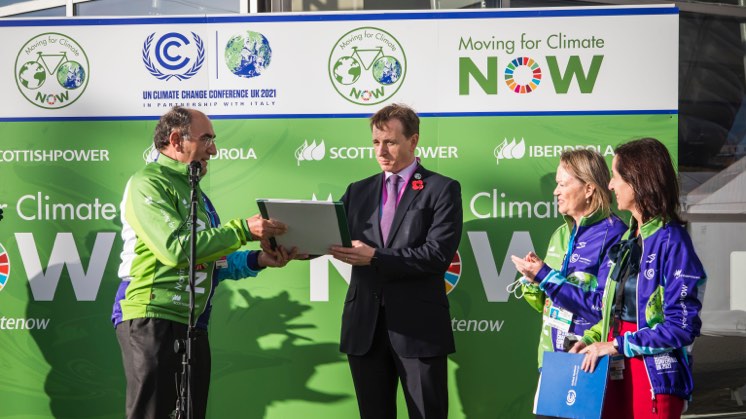COP26: Iberdrola at the 2021 Climate Conference
We push for climate action at COP 26 to meet the Paris Agreement goals
Under the slogan Uniting the world to tackle climate change, the United Nations Climate Change Conference (COP26) —held in Glasgow (United Kingdom) from 31 October to 12 November 2021— brought together representatives of some 200 governments with the aim of accelerating climate action to comply with the Paris Agreement. For yet another year, the Iberdrola group actively participated in this summit to show its commitment to a sustainable energy model that generates opportunities.
Iberdrola actively participated in the Climate Summit held in Glasgow.
Main agreements reached at COP26
COP26 External link, opens in new window. emphasised the urgency and opportunities of moving towards a carbon neutral economy and called for transparency and rigour in the climate action plans of both governments and companies. Thus, it gave birth to the Glasgow Climate Pact, a document containing guidelines for policy action agreed among all countries. The pact includes the following agreements:
External link, opens in new window. emphasised the urgency and opportunities of moving towards a carbon neutral economy and called for transparency and rigour in the climate action plans of both governments and companies. Thus, it gave birth to the Glasgow Climate Pact, a document containing guidelines for policy action agreed among all countries. The pact includes the following agreements:
The 1.5°C scenario is kept alive — with quantitative targets and explicit references to the reduction of coal and fossil fuel subsidies — and the need to meet it is recognised in order to avoid devastating effects. To this end, it is imperative to reduce emissions by 45% — compared to 2010 levels — by 2030 and to reach net zero emissions by 2050. In this context, countries are urged to accelerate their climate action and urged to review and increase their 2030 targets, in line with the Paris Agreement, before the end of 2022.
Coal reductions and the elimination of inefficient fossil fuel subsidies must be accelerated, with support for a just transition.
Developed countries must work to urgently and transparently meet the $100 billion climate finance target. Multilateral banks will have to align their investment portfolios with the Paris Agreement, as well as to revise this target upwards by 2025. Multilateral banks and developed countries are urged to align their financing activities with the Paris Agreement.
It sets out a two-year plan to set a global climate change adaptation target and calls on developed countries to double their adaptation finance support to developing countries by 2025.
Businesses will be able to participate in the 2030 Global Stocktake, a diagnosis of the situation on the basis of which decisions will be taken and climate laws revised. This participation will be channelled through climate champions.
A financial support mechanism is put in place to help developing countries cope with the impacts of climate change.
In addition to this pact, important political commitments and partnerships were announced at COP26, including the following:
The China-US Declaration to jointly strengthen climate action under the 1.5°C scenario. This collaboration will be articulated around five areas of action: regulations and standards to promote deep emissions reductions during this decade, transition to a clean energy model, end-use electrification, circular economy and technologies to capture CO2 from the atmosphere.
India announced strong renewable growth by 2030 (500 GW of clean energy by 2030) and its goal of climate neutrality by 2070.
A large group of countries and civil society leaders and companies, including Iberdrola, have signed up to the Global Coal to Clean Power Transition Statement
 External link, opens in new window., committing to support the acceleration of clean energy development in parallel to coal closure, as part of the just transition.
External link, opens in new window., committing to support the acceleration of clean energy development in parallel to coal closure, as part of the just transition.
More than 30 countries — including the United States, Canada and Italy — have committed to end public support for fossil fuels by the end of 2022.
More than 35 countries — including the European Union and India — will work together to promote the use of clean energy in all sectors by 2030 in the so-called Glasgow Breakthrough Agenda.
For its part, the private sector showed its support for carbon neutrality targets. In the case of Iberdrola, it joined both the aforementioned statement on the closure of coal and the one on the transition to zero-emission vehicles External link, opens in new window.. The company is also part of the Race to Zero
External link, opens in new window.. The company is also part of the Race to Zero External link, opens in new window. campaign, through which power generators have pledged to have more than 750 GW of renewables by 2030. Iberdrola is also a member of the Green Hydrogen Catapult
External link, opens in new window. campaign, through which power generators have pledged to have more than 750 GW of renewables by 2030. Iberdrola is also a member of the Green Hydrogen Catapult External link, opens in new window. coalition, which plans to develop 45 GW of electrolysers by 2026.
External link, opens in new window. coalition, which plans to develop 45 GW of electrolysers by 2026.
Iberdrola's leadership in COP26
At COP26, Iberdrola Group demonstrated its commitment to a sustainable energy model that generates opportunities, and defended climate action as a central pillar of its strategy for sustainable development and respect for the environment. As the main partner of the Glasgow Summit — through its subsidiary in the United Kingdom, ScottishPower —, the company actively participated in various initiatives, forums and high-level meetings with members of the British government, the United Nations, the International Energy Agency, the European Climate Foundation and We Mean Business, among other organisations.
In total we organised more than 100 events with international and local institutions — more than half of them at ScottishPower's headquarters —, such as the energy transition meeting it held in collaboration with the British government or the Electric Mobility Revolution event, in partnership with the World Business Council for Sustainable Development (WBCSD).
ScottishPower, principal partner for COP26
The group's subsidiary in the United Kingdom, ScottishPower, took part as the principal partner of the Glasgow COP External link, opens in new window., where it has its corporate headquarters. The COP26 Presidency partnered with companies that stand out for their ambitious climate commitments and that have credible, short-term, science-based emission reduction plans in line with the Paris Agreement targets. These companies lent their resources and expertise to helped make the conference a success and helped develop international actions to address climate change.
External link, opens in new window., where it has its corporate headquarters. The COP26 Presidency partnered with companies that stand out for their ambitious climate commitments and that have credible, short-term, science-based emission reduction plans in line with the Paris Agreement targets. These companies lent their resources and expertise to helped make the conference a success and helped develop international actions to address climate change.
COP26 President Alok Sharma (centre of image) visited Whitelee wind farm, accompanied by ScottishPower CEO Keith Anderson and ScottishPower Renewables CEO Lindsay McQuade.
ScottishPower External link, opens in new window. was the first integrated energy company in the UK to have 100 % clean generation, producing all its electricity from offshore and onshore power. Of the 75 billion the group plans to invest between 2020 and 2025, some 10.88 billion will go to the United Kingdom in order to lead the country's transition to a carbon-neutral economy.
External link, opens in new window. was the first integrated energy company in the UK to have 100 % clean generation, producing all its electricity from offshore and onshore power. Of the 75 billion the group plans to invest between 2020 and 2025, some 10.88 billion will go to the United Kingdom in order to lead the country's transition to a carbon-neutral economy.
As principal partner of the COP26, the company has driven climate action to increase ambition and accelerate the measures needed to move towards a safer climate for all. In addition, it has contributed to raise public awareness about the importance and urgency of this challenge and how the need for a sustainable and fairer future must be at the heart of the recovery of the world economy.
Moving for Climate NOW
For yet another year, Iberdrola participated in the climate summit with Moving for Climate NOWExternal link, opens in new window., an initiative whose aim is to raise international awareness of the importance of acting now against climate change. It is a route in which experts from different fields travel by electric bicycle to the COP to deliver their Manifesto against climate change to the United Nations [PDF], in which they set out the main lines of action and draw attention to the urgency of uniting the efforts of all agents to combat the climate emergency. The march started in Edinburgh on 6 November and travelled 300 kilometres to Glasgow, where it arrived on 9 November.

The team arrived in Glasgow on 9 November, having travelled over 270 kilometres in four days.
Moving for Climate NOW came to Motherwell in its third stage.
In its second stage, Moving for Climate NOW traveled from Lanark to Troon.
Moving for Climate NOW kicked off in Edinburgh.
Iberdrola stand at COP26
Iberdrola had a stand within the COP26 Green Zone, an area open to the public with the purpose of promoting the involvement of civil society. The stand was a sustainable space that made the group's climate leadership visible and offered specialised presentations and audiovisual content to present its actions, initiatives and commitments to meet the objectives in the fight against climate change and to promote social mobilisation in the face of this challenge.
Specifically, the main theme of the space was the power of nature as a source of clean and ecological energy, highlighting the company's pioneering commitment to renewable energies and decarbonisation. Visitors were able to feel the forces of nature through a climate tunnel, an immersive experience that combined images projected on large LED screens with lighting, sound, heat, movement and smell effects. They also interacted with a large tactile globe that showed the most relevant data of the group in the different countries where it is present.
The power of nature's clean energy was the protagonist of Iberdrola's stand at COP26.
A group of Scottish schoolchildren visit the Iberdrola stand.
Iberdrola's contribution to fulfilling the COP26 targets
Iberdrola is now an international benchmark in the fight against climate change and continues to make progress in this area. Thus, it has announced a historic investment plan for 2020-2025 by which it commits itself to investing nearly 35 billion euros in renewable energies and more than 27 billion euros in smart grids until the middle of the decade. In addition, this plan has been increased to €150 billion by 2030, which will enable the company to triple its renewable capacity and double its regulated assets by the end of the period, with 90 % of this investment aligned with the European Union taxonomy for mitigating climate change.
This strategy will enable Iberdrola to become a carbon-neutral company in Europe by 2030 and reduce its global CO2 emissions to 50 g/kWh. It aims to achieve global carbon neutrality by 2050.

Global leader in the fight against climate change
Fully in line with the Paris Agreement, Iberdrola group aims to reduce its CO2 emissions to 50 gCO2/kWh by 2030 and become globally carbon neutral by 2050.

Ambitious and urgent climate action
The fight against climate change has been the driving force behind the strategy of the company, which has invested more than 100,000 million euros over the last 20 years to achieve a decarbonised energy model.

Active presence at climate conferences
Iberdrola is very active in the global and regional debate on climate policy and actively participates in the global climate agenda.

Aligned with the UN SDG 13
The group focuses on meeting Sustainable Development Goal 13, climate action, by actively and resolutely contributing to a sustainable, low-carbon future.

We are committed to the Green Recovery
Firmly convinced that recovery after COVID-19 can only be green, Iberdrola has accelerated its investments in renewable energies, digitalisation and electric mobility.

We are leading the energy transition
The company has a historic investment plan of 75 billion euros up to 2025 to anticipate the energy revolution facing the world economy.

We are a world leader in renewables
The group began its commitment to renewable energies more than two decades ago, as a fundamental pillar on which to build its clean, reliable and intelligent business model.

We are driving sustainable mobility
Iberdrola is strengthening its strategy against climate change through its Sustainable Mobility Plan, launched in 2016 with the aim of moving towards the electrification of transport.

International leader in green financing
We are the leading corporate group in green bond issuance worldwide and the first Spanish issuer to join the sustainable bond network of the Nasdaq index.

Transparency in the management of climate risk
The company has implemented the TCFD's 11 recommendations on transparency in the management of risks and opportunities arising from climate change.
All the information about
The COP26
What is the COP?
The Conference of the Parties or COP is the supreme body of the United Nations Framework Convention on Climate Change (UNFCCC), a treaty that sets out the basic obligations of the 196 states (or parties) and the European Union to combat climate change. It was signed at the 1992 Earth Summit and came into force in 1994. Since then, a COP has been held every year to review the status of its implementation and to propose, evaluate and approve other instruments to support its establishment.
Who participates in the COP?
The parties are member states of the UNFCCC and the European Union, currently some 200 countries, which participate through their heads of state or government or, on their behalf, their ministers. In addition to the parties, representatives of companies, international organisations, interest groups or associations may be present at the COP as observadores.
What is the objective of the COP?
The COP brings governments from all around the world together with thousands of scientists, business people, institutional representatives and NGOs to announce new climate commitments and push forward climate change negotiations, with the aim of making all items of the Paris Agreement operative. It is therefore an inescapable event on the global climate agenda.
How many COPs have been held?
25 COPs have been held since 1995. The first one took place in Berlin and, since then, they have been held in different cities in Europe, America, Africa and Asia. Bonn (Germany) has hosted several COPs as the seat of the UNFCCC.
Where and when is COP26 being held?
COP26 is being held in Glasgow, United Kingdom, from 1 to 12 November 2021 at the Scottish Event Campus (SEC). The 26.ª Conference of the Parties was originally scheduled for November 2020, but the UNFCCC decided to postpone it to 2021 because of the COVID-19 pandemic.
Glasgow has been chosen to host the Climate Summit because of its commitment to and record on sustainability. The Scottish city has set itself the target of becoming carbon neutral by 2030 and aims to become one of Europe's greenest cities through its Sustainable Glasgow campaign. It also ranks fourth in the Global Destination Sustainability Index.
Who will chair the COP26?
The United Kingdom is chairing COP26 in partnership with Italy. This is the first time the UK has hosted a Conference of the Parties in recognition of its leadership in the fight against climate change.
The United Kingdom has reduced its emissions by over 40 % since 1990 and it is the world's largest producer of offshore wind energy. It was the first major economy to pass carbon-neutral legislation and has announced plans to double its international climate funding and mobilise support for developing countries. The country, which has a 25-year Environmental Plan to address today's major environmental problems including air quality, nature recovery, waste reduction and resource efficiency, predicts that its low-carbon economy will grow four times faster than the rest of the world economy by 2030.
Why is the COP26 important?
COP26 has brought together more than 30,000 delegates, including heads of state, climate experts, businesses and activists, to agree on a coordinated action plan to meet the objectives set out in the Paris Agreement: to keep global temperature increases well below 2 °C and to move towards climate and energy scenarios that help limit them to 1.5 °C. To this end, countries have been called upon to take an ambitious approach to renewing their climate commitments or NDCs (Nationally Determined Contributions).
What is the slogan of the COP26?
The slogan of COP26 is Uniting the world to tackle climate change, emphasising the importance of international cooperation to address climate change.
What other activities will take place in the framework of COP26?
From 30 September to 2 October 2021 the Pre-COP took place in Milan (Italy), a preparatory meeting attended by 35-40 countries, representatives of the UNFCCC Secretariat, the chairs of the Convention's subsidiary bodies and a number of stakeholders that play a key role in the fight against climate change and the transition to sustainable development. The event provided an informal setting to discuss and exchange views on some essential policy aspects of the subsequent negotiations.
Before this, the Youth Summit was held from 28 to 30 September also in Milan, bringing together almost 400 young people aged 18 to 29 from the 197 member countries of the UNFCCC to draw up concrete proposals on issues affecting the negotiations at the Pre-COP in Milan and the COP in Glasgow. Entitled Youth for Climate: Driving ambition, the meeting included two days dedicated to the working groups and a final day of discussion between the young delegates and the ministers attending the Pre-COP26.



































